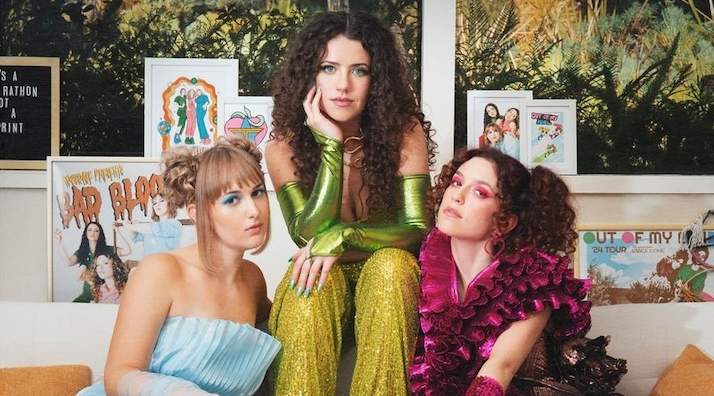Trousdale Explains the Science of Singing as a Trio and Dishes on New Album Growing Pains [Q&A]

Photo by Alex Lang
Trousdale, the Los Angeles, CA-based country-pop trio, are an engaging, dominant force within the modern scene. Capturing the essence of both the cohesiveness of popular bands from the 60’s/70’s (The Beach Boys, Fleetwood Mac) and 90’s/00’s female-driven power country (Faith Hill, Lady A) the trio, formed during the girls’ college years at the University of Southern California, smoothly sift between plush ballads ripe with introspective lyrics, harmonic-driven reflections of classic Americana, and resourcefully crafted pop bangers with instant commercial appeal.
A performance at NYC’s Hudson Yards this past summer was an elegant and precise depiction of their unit. The trio, on and off instruments throughout, maneuvered through a well-paced setlist of original material including the tour-de-force “If I’m Honest” and the spellbinding “Always, Joni,” as well as a now-canon cover of “The Chain” by Fleetwood Mac, worked through slight vocal glitches, and supported member Georgia Greene as she fought through lingering sickness. Greene, who credits much of her vocal prowess to renown vocal coach Jeffrey Allen, powered through her supposed limitations, delivering her signature belts, trills, and technically proficient growls with finesse and poise.
On their latest album, Growing Pains, out now, Georgia presents her vocal pyrotechnics in what is, perhaps, the most understated manner yet on a Trousdale project. She is on a level playing field with fellow members Quinn D’Andrea and Lauren Jones, both offering their own skilled and educated approaches and understanding of vocal health and synchronization, emotional rendering of material, and accessing elements of their influences to apply to their own material.
Growing Pains highlights experiences that are both formative and fleeting. Not just physical growing pains, but those leaving a lasting impression on the soul, the heart, and the mind. From the ‘all work and no play’ aspect of adulthood, allowing life and those around us to unknowingly pass by, and the fear of walking away, among additional conditions, Trousdale depicts these stories with care.
Trousdale’s musical versatility is demonstrated by the breadth of the sonic palette of the record… from soft adult-contemporary country on “Warm Shoulder, Cold Heart” and “Sleeping at the Wheel,” the countrified pop of “Vertigo” and “Lonely Night,” hints of blues and funk on “Save Me,” and traditional acoustic guitar or pedal steel-led tracks with “Secondhand Smoke” and “Death Grip.” The trio possesses the ability to perform with the tenderness and restraint of the original highwomen (Dolly Parton, Linda Ronstadt, and Emmylou Harris) while effectively inserting modern affectations and perspectives into their growing catalog.
OnesToWatch: What is it like to be coming up and actively releasing music in an era of so many female driven bands like HAIM, MUNA, Boygenius, The Marias, and The Last Dinner Party, but knowing that you’re doing something different?
Georgia: We’re ready to fly! We’ve been doing this for long enough, and have worn all the hats, that we’ve learned a lot of things about the different parts of the music industry.
Lauren: All of us are song first kind of people, and we always gravitate towards good music, no matter the genre. There are a lot of bands from the 60’s and 70’s that are references for us, and it’s cool to see other female-led bands now coming up at the same time. They’re always there, it’s a matter of whether or not they get recognition.
Could you see yourselves ever diving into a more improvisational, harmonic territory in vain of a Manhattan Transfer or a Take 6? A sound that’s a bit more freewheeling and less focused on typical song structure?
Quinn: Oh my gosh, I don’t know! They’re both amazing, incredible vocal groups. That is sometimes how we might go about the creative side of it, and then how we perform is quite structured for a reason. We structure it to leave bits of improvisation. As we evolve, there might be more room for that. It’s ever evolving, but we love the structure because we built it to make sure that people are feeling a certain thing.
You’ve previously talked about the process of ‘locking in’ to these harmonies. Because you all know each other so well, do you think that you can tell when something is NOT about to lock in based on each other’s facial expressions, body language, etc.?
Quinn: That’s so funny… I think probably, yeah!
[Lauren and Georgia exclaim similar affirmations]
Quinn: That’s a really interesting question, right? There’s a lot of communication that happens between the three of us without speaking, and we can all feel when something IS off externally.
Georgia: I don’t know if we can know before it happens, but we can know after. We’ll be like, ‘Sorry, that was me,’ or, ‘Are you good?’
Lauren: Singing is such a physical act. Our instrument is our body. There are a lot of circumstances when you’re singing that will determine how you sound. What time of day is it? Have you warmed up? Is your voice tired? All of those things, and more, impact your body and your voice. Those are the only indicators I can think of that before we even open our mouths to sing a note, it’s like, ‘Oop, how are we going to sound?’
Do you think that ANYONE can learn to blend to a point where the ego is removed and it’s all about a collective cohesiveness?
Georgia: That’s a big question. I love that question.
Quinn: Yes!
Georgia: Everyone has an ego, but in this particular group setting… you’re just listening, and it’s a form of spiritual communication and connection. You have the same goal of trying to get the sound to lock. For harmony to be made. Harmony itself is spiritual. You’re not trying to stand out, you’re just trying to make the chords sound right.
Quinn: You have to understand harmony and practice it enough to be able to listen more to other people than what you yourself are singing. Consistent singing, and really being able to confidently sing your own harmony, and understand where you sit within it, you don’t have to even hear yourself. That’s the biggest part of blending. To not be listening to your own voice, but be listening to what is happening altogether. I definitely think people can learn that.
Georgia, what do you think the key is to a really impactful, and not overindulgent belt or vocal growl?
Georgia: Jeffrey Allen is the vocal savior of a lifetime. He always teaches to drop the soft palette as open as you possibly can, and to think of it as a horizontal line instead of thinking vertical. You’re trying to scoop as much gold, as he calls it, from your nasal cavity. I picture a horizontal plane, which in turn helps with posture. I’m also engaging my abs and thinking about certain vowel modifications.
For Lauren and Quinn, when Georgia is up an octave, and there is a missing piece of the original harmony, how do you maintain what has already been built?
Quinn: There is a lot of awareness that happens in our songs. When Georgia jumps up, sometimes, if I’m singing the lowest part, I’ll jump up so that all three of us don’t have to change the parts we’re singing and something can stay consistent. Or, Lauren and I will just invert up, because to have something up that high and to keep two low close harmonies feels too distant, and it’s not supporting the work that Georgia has to do up there.
This record is said to have been ‘recorded live.’ Does that mean what we’re hearing is the result of a live take, whether that be the first or the twelfth take?
Lauren: Drums, bass, and electric guitar were all recorded at the same time, so you have all the musicians playing off each other which adds to more of a live feel. We get 5-6 takes of those instruments together, and from there you comp between them. The vocals are not live. The goal for the album was to have more of a live feel for the rhythm section while still having a polished vocal sound.
In the case of “Want Me Back,” where there were two differing ideas of where the song would go… one more pop, the other more country, does that make it more difficult to land on something concrete for its end product?
Quinn: Most of the time, it definitely does. It’s so much easier if all three of us are unanimous, and if we have a clear idea. For that song… NONE of us had a clear idea, and no one else in the room did either. It was unique. It played itself out. The overall genre, and all of the pieces that came together started showing themselves and became obvious as we played it. It is harder especially if we have differing views and we’re trying to meet somewhere in the middle, because sometimes meeting in the middle is not making a decisive choice. “Want Me Back” was a really beautiful example of none of us compromising the quality of what we wanted it to be.
The opposite of that, to my ears, are “Death Grip,” “Warm Shoulder, Cold Heart, “Don’t Tell Me,” and “Secondhand Smoke.” Songs that came with a bow on top. Would you say that is accurate?
Georgia: For those, I would say yes. And I’d say yes for most of Trousdale’s experience, and the way that we deal with the ones that aren’t coming with a bow on top is a part of why we’ve been together for over 10 years. It’s a part of the communication that we have.
Quinn: I think because we rehearsed with a band before this one, it made it easier because we weren’t working with puzzle pieces we couldn’t see or couldn’t understand. We saw all the puzzle pieces in front of us, and were able to shift them in real time.
If I stay a little bit longer… Does it make me a fighter? Does it make me a fool?
If I wait for you to put out this fire… Is it a matter of time ‘til I burn with you
Is your secondhand smoke gonna kill me too?
The growing pains you’re writing about here seem rather poignant. Things that have simmered. What about the fleeting things? The things that seem impactful in the moment, but are afterthoughts six months later? Do those become songs, or ideas of songs, too?
Georgia: Even some of the songs on this record ARE fleeting thoughts. A lot of songwriting lets you make a fleeting thought into a lasting song. We’re human beings that are changing all the time. Writing it is like marking it in real time, and helping you let go.
Lauren: Writing is a great way to work through difficult things. In the best situations, by the time you are done writing a song, you’re at peace with whatever it was about. In a lot of ways, most of the songs we sing aren’t relevant, or maybe never were. You just have to find your way, as a performer and artist, to the truth of that song and how that can spark a chord with you and how to keep it fresh performing it night after night, and how that changes. I think it HAS to change.
What’s the sonic distinction between a growing pain that results in a ballad versus songs that have more firepower to them like “Save Me” or “Vertigo”?
Quinn: I think it depends on the root feeling of it. The title track comes from this combination of frustration and exhaustion, but also motivation. How the motivation is the overpowering answer at the end. Other songs, like “Secondhand Smoke” or “Warm Shoulder, Cold Heart” have a more somber resolve of, ‘I’m still learning and growing from this, but it doesn’t have to be a good thing.’ Touching on all of that, and making people feel all those things with one project is so important because it’s all a part of growing. It doesn’t have to be, ‘I have the answer or a solution or I’m better.’ Growing can still be, ‘I’m not ok, and I don’t know what to do about it yet,’ and knowing that that is alright as well.
Fallin forward, straight into the vertigo / It won’t be easy learnin’ how to let it go
I’m overheating but I’m not burning out / I’m gonna make it out, I’m gonna make it out
There are a lot of sounds you’re applying, but doing your own thing with, on this album. How is it important for you to not regurgitate one sound for an entire project?
Lauren: It has always been about the song. It’s about building the production around whatever serves the song best. We have so many different influences, and we tend to write songs that ask for something slightly different. With “Vertigo,” we were looking for an endcap thought. Acknowledging the crazy and submitting to it. It’s not fun to experience vertigo. It’s a symptom of adjustment, essentially, and it can make you feel crazy, but hopefully you come out of it on the other side more grounded. It always comes from the way we sing a song too.
What is one thing, for each of you individually, that the other two push you to be better at or overcome?
Quinn: I’m a better songwriter because of the two of them. I didn’t write a ton until towards the end of college, and was very fearful about expressing my ideas. Both of them, in very different ways, state their ideas very proudly, and I’ve always looked up to that.
Lauren: I’ve definitely become a better singer, and a better communicator and collaborator. I tend to be pretty hard headed in writing, and I’ve just become a better listener.
Georgia: I feel more confident because of how we’ve worked together, and I take myself more seriously because of how Lauren and Quinn believe in themselves.
Listen to Growing Pains, out now:

![Pop Star Seanna Pereira Has Entered the Conversation [Q&A]](https://s3-us-west-2.amazonaws.com/onestowatch-v2/a003_c005_251211_l6.mxf.12_33_49_20._still002-_i_p_h_o_n_e-1771968603.jpg)

